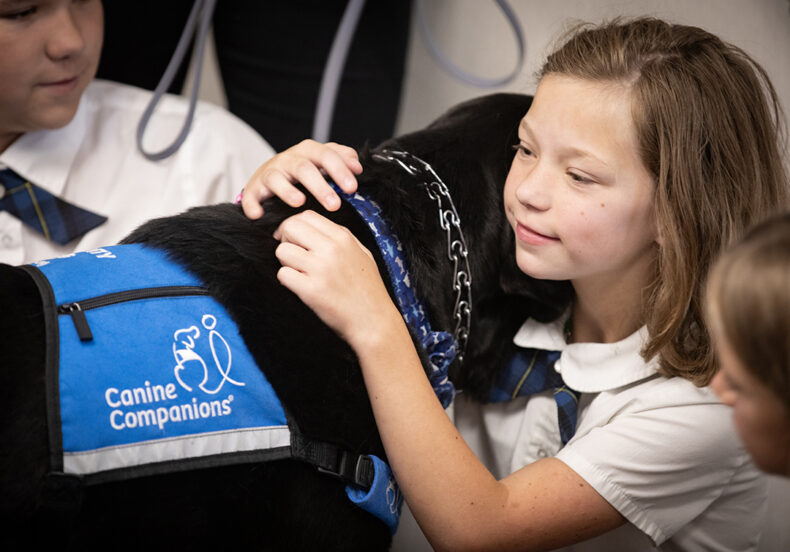by Jessica Pasley
Every day, thousands of highly trained and dedicated employees enter the doors of Monroe Carell Jr. Children’s Hospital at Vanderbilt. All are part of a team that supports, comforts and provides care to patients and families.

But only one is a wet-nosed, tail-wagging, black Labrador/Golden Retriever mix named Squid.
The 2-year-old canine is the newest member of the Patient and Family Centered Care team. Squid joined the staff in February thanks to the generosity of Mars Petcare.
It’s a perfect fit — helping patients and families is a job he was born to do.
“Facility dogs are trained to engage patients to help them achieve a specific treatment goal,” said Leslie Grissim, MA, facility dog coordinator. “Engaging a patient using an animal who can decrease anxiety and increase motivation to meet a therapeutic goal is just another tool in our toolbox.
“People are drawn to the human-animal bond. Animal-assisted interventions offer both patients and staff the ability to talk without barriers and opportunity to express themselves in a way that may not be possible with another human. Connecting with an animal can break down walls. We are so excited about this form of intervention and building this program,” Grissim said.
The Facility Dog Program at Children’s Hospital was established through collaboration with Mars Petcare to support a full-time facility dog and a staff position for coordination of the program, with the overall goal of showing the positive impact a facility dog can have on patients, families and staff.
“Now more than ever, people are turning to pets for comfort and companionship, and we can’t wait to see the positive impact Squid has for the children, families and staff at Monroe Carell Jr. Children’s Hospital at Vanderbilt,” said Mark Johnson, president of Mars Petcare North America.
“We’re thrilled to partner with the team at Vanderbilt to bring this facility dog program to life.”
Through its BETTER CITIES FOR PETS program, Mars Petcare seeks to bring the healing power of pets to more children and families. The collaboration between Children’s Hospital and Mars Petcare, announced in 2018, will support efforts to harness the power of pets to improve the health of patients.

“This has been three years in the making,” said Janet Cross, MEd, administrative director of Patient- and Family-Centered Care at Children’s Hospital. “We have been keeping our fingers on the pulse of what is new and innovative that can be used to engage people in healing. Facility dogs fit that bill for our hospital. There has been a lot of evidence around the effectiveness of facility dogs in the medical setting.”
“We have a well-established volunteer pet partner program, and we’ve seen how successful those teams are at engaging our patients and families. A facility dog will take that engagement to a higher level. Squid was bred for this kind of work.”
Squid is a Canine Companions for Independence-certified facility dog. He completed an extensive two-year training regime and most recently graduated from an intensive two-week instruction with Grissim and Erin Munn, Child Life Specialist 3, who will serve as the secondary handler.
Raised under the Canine Companions Prison Puppy Raising Program, which partners with the Gadsden Correctional Facility in Florida, Squid spent nearly one year under the care of a female inmate.
He was then transferred to a puppy raiser for socialization before enrolling in the Canine Companions professional training program, which provides highly trained assistance dogs to children and adults with disabilities.
Squid can perform more than 40 commands designed to motivate and inspire patients to obtain treatment goals. In addition to engaging patients in their treatment, the dog will provide comfort and affection to support families and hospital staff experiencing the impact of intense medical situations.
Like any other employee, Squid wears a badge at all times and will always be accompanied by either Grissim or Munn. The pair continues to integrate Squid into the everyday functions of the hospital.
A key component of this effort is to collect data that demonstrates the health, well-being and economic impact a facility dog, used as a therapeutic tool, can have on patients, families and staff. Ultimately, Children’s Hospital will use this information to provide better outcomes for more patients and families, said Cross.











